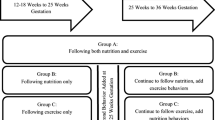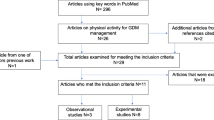Abstract
To identify adherence required to achieve target health outcome(s) in nutrition and/or exercise interventions, a measurement tool that tracks objective and self-reported measures of adherence is necessary. The purpose of this study was to design an adherence measurement tool and test it retrospectively on the Nutrition and Exercise Lifestyle Intervention Program (NELIP; Ruchat et al., Medicine and Science in Sports and Exercise, 44(8), 1419–1426, 2012; Mottola et al., Medicine and Science in Sports and Exercise, 42(2), 265–272, 2010), designed to prevent excessive gestational weight gain (EGWG). The tool was based on the goals of the NELIP and included a grading system for each behavior (exercise and nutrition). It was used to determine whether adherence scores could differentiate excessive versus acceptable weight gain during pregnancy across pre-pregnancy body mass index (BMI) categories. Results showed irrespective of pre-pregnancy BMI, women with acceptable weight gain had significantly higher adherence (p < 0.05) than women with excessive weight gain. It is recommended that this adherence tool be included in future prospective lifestyle intervention studies.
Similar content being viewed by others
References
Anderson, E. S., Winett, R. A., & Woicik, J. R. (2007). Self-regulation, self-efficacy, outcome expectations and social support: social cognitive theory and nutrition behavior. Annals of Behavioral Medicine, 34(3), 304–312.
Asbee, S. M., Jenkins, T. R., Butler, J. R., White, J., Elliot, M., & Rutledge, A. (2009). Preventing excessive weight gain during pregnancy through dietary and lifestyle counseling: a randomized controlled trial. Obstetrics and Gynecology. doi:10.1097/AOG.0b013e318195bae.
Barakat, R., Pelaez, M., Cordero, Y., Perales, M., Lopez, C., Coteron, J., & Mottola, M. F. (2015). Exercise during pregnancy protects against hypertension and macrosomia: randomized clinical trial. American journal of obstetrics and gynecology. doi:10.1016/j.ajog.2015.11.039.
Barakat, R., Pelaez, M., Montejo, R., Refoyo, I., & Coteron, J. (2014). Exercise throughout pregnancy does not cause preterm delivery: a randomized controlled trial. Journal or physical activity and health, 11(5), 1012–1017.
Bodnar, L. M., Siega-Riz, A. M., Simhan, H. N., Himes, K. P., & Abrams, B. (2010). Severe obesity, gestational weight gain, and adverse birth outcomes. American journal of clinical nutrition, 91(6), 1642–1648.
Choi, J., Fukuoka, Y., & Lee, J. H. (2013). The effects of physical activity and physical activity plus diet interventions on body weight in overweight or obese women who are pregnant or in postpartum: a systematic review and meta-analysis of randomized controlled trials. Preventative medicine, 56(6), 351–364.
Colditz, G. A., & Taylor, P. R. (2010). Prevention trials: their place in how we understand the value of prevention strategies. Annual review of public health, 31, 105–120.
Cordero, Y., Mottola, M. F., Vargas, J., Blanco, M., & Barakat, R. (2015). Exercise is associated with a reduction in gestational diabetes mellitus. Journal of medical science in sports and exercise, 47(7), 1328–1333.
Dodd, J. M., Grivell, R. M., Crowther, C. A., & Robinson, J. S. (2010). Antenatal interventions for overweight or obese pregnant women: a systematic review or randomised trials. BJOG, 117(11), 1316–1326.
Dominques, M. R., Bassani, D. G., da Silva, S. G., Coll Cde, V., da Silva, B. G., & Hallal, P. C. (2015). Physical activity during pregnancy and maternal-child health (PAMELA): study protocol for a randomized controlled trial. Trials. doi:10.1186/s13063-015-0749-3.
Guelinckx, I., Devlieger, R., Mullie, P., & Vansant, G. (2010). Effect of lifestyle intervention on dietary habits, physical activity and gestational weight gain in obese pregnant women: a randomized controlled trial. American Journal of Clinical Nutrition, 91(2), 373–380.
Haakstad, L. A., & Bø, K. (2011). Exercise in pregnant women and birth weight: a randomized controlled trial. BMC pregnancy and childbirth. doi:10.1186/1471-2393-11-66.
Hui, A. L., Back, L., Ludwig, S., Gardiner, P., Sevenhuysen, G., Dean, H. J., et al. (2014). Effects of lifestyle intervention on dietary intake, physical activity level, and gestational weight gain in pregnant women with different pre-pregnancy body mass index in a randomized control trial. BMC pregnancy and childbirth. doi:10.1186/1471-2393-14-331.
Institute of Medicine. (2009). Weight during pregnancy: reexamining the guidelines. Washington (DC): National Academy Press. National Academy of Science.
Krukowski, R. A., West, D., DiCarlo, M., Shankar, K., Cleves, M. A., Tedford, E., & Andres, A. (2016). A behavioral intervention to reduce excessive gestational weight gain. Maternal and child health journal. doi:10.1007/s10995-016-2127-5.
Kuhlmann, A. K., Dietz, P. M., Galavotti, C., & England, L. J. (2008). Weight-management interventions for pregnant or postpartum women. American journal of preventative medicine, 34(6), 523–528.
Lee, K. K., Raja, E. A., Lee, A. J., Bhattacharya, S., Norman, J. E., & Reynolds, R. M. (2015). Maternal obesity during pregnancy associated with premature mortality and major cardiovascular events in later life. Hypertension, 66(5), 938–944.
Leslie, W. S., Gibson, A., & Hankey, C. R. (2013). Prevention and management of excessive gestational weight gain: a survey of overweight and obese pregnant women. BMC Pregnancy and Childbirth. doi:10.1186/1471-2393-13-10.
Martin, K. A., Bowen, D. J., Dunbar-Jacob, J., & Perri, M. (2000). Who will adhere? Key issues in the study and prediction of adherence in randomized controlled trials. Controlled clinical trials, 21(5), S195–S199.
McDonald, S. M., Liu, J., Wilcox, S., Lau, E. Y., & Archer, E. (2016). Does dose matter in reducing gestational weight gain in exercise interventions? A systematic review of literature. Journal of science and medicine, 19(4), 323–335.
Mottola, M. F., Giroux, I., Gratton, R., Hammond, J. A., Hanley, A., Harris, S., et al. (2010). Nutrition and exercise prevent excess weight gain in overweight pregnant women. Medicine and Science in Sports and Exercise, 42(2), 265–272.
Nascimento, S. L., Pudwell, J., Surita, F. G., Adamo, K. G., & Smith, G. N. (2014). The effect of physical exercise strategies on weight loss in postpartum women: a systematic review and meta-analysis. International Journal of Obesity (London), 38(5), 626–635.
Nascimento, S. L., Surita, F. G., Parpinelli, M. A., Siani, S., & Pinto e Silva, J. L. (2011). The effect of an antenatal physical exercise programme on maternal/perinatal outcomes and quality of life in overweight and obese pregnant women: a randomised clinical trial. BJOG, 118(12), 1455–1463.
Oostdam, N., van Poppel, M. N., Wouters, M. G., Eekhoff, E. M., Bekedam, D. J., Kuchenbeker, W. K., et al. (2012). No effect of the FitFor2 exercise programme on blood glucose, insulin sensitivity, and birthweight in pregnant women who were overweight and at risk for gestational diabetes: results of a randomised controlled trial. BJOG, 119(9), 1098–1107.
Phelan, S., Jankovitz, K., Hagobian, T., & Abrams, B. (2011b). Reducing excessive gestational weight gain: lessons from weight control literature and avenues for future research. Women’s Health (Lond Engl), 7(6), 641–661.
Phelan, S., Phipps, M. G., Abrams, B., Darroch, F., Schaffner, A., & Wing, R. R. (2011a). Randomized trial of a behavioural intervention to prevent excessive gestational weight gain: the fit for delivery study. American Journal of Clinical Nutrition, 93(4), 771–779.
Polley, B. A., Wing, R. R., & Sims, C. J. (2002). Randomized controlled trial to prevent excessive weight gain in pregnant women. International journal of obesity related metabolic disorders, 26(11), 1494–1502.
Ruchat, S. M., Davenport, M. H., Giroux, I., Hillier, M., Batada, A., Sopper, M. M., et al. (2012). Nutrition and exercise reduce excessive weight gain in normal-weight pregnant women. Medicine and Science in Sports and Exercise, 44(8), 1419–1426.
Ruchat, S. M., & Mottola, M. F. (2012). Preventing long-term obesity for two generations: prenatal physical activity is a part of the puzzle. Journal of Pregnancy. doi:10.1155/2012/47024.
Shirazian, T., Faris, B. S., Fox, N. S., Friedman Jr., F., & Rebarber, A. (2016). The lifestyle modification project: Limiting pregnancy weight gain in obese women. Journal of maternal and fetal neonatal medicine, 29(1), 80–84.
Shub, A., Huning, E. Y., Campbell, K. J., & McCarthy, E. A. (2013). Pregnant women’s knowledge of weight, weight gain, complications of obesity and weight management strategies in pregnancy. BMC Research Notes. doi:10.1186/1756-0500-6-278.
Siega-Riz, A. M., & Laraia, B. (2006). The implications of maternal overweight and obesity on the course of pregnancy and birth outcomes. Maternal Child Health Journal, 10, 153–156.
Skouteris, H., Hartley-Clark, L., McCabe, M., Milgrom, J., Kent, B., Herring, S. J., & Gale, J. (2010). Preventing excessive gestational weight: a systematic review of interventions. Obesity Review, 11(11), 757–768.
Streuling, I., Beyerlein, A., & von Kries, R. (2010). Can gestational weight gain be modified by increasing physical activity and diet counseling? A meta-analysis of interventional trials. American journal of clinical nutrition, 92(4), 678–687.
Stüber, T. N., Künzel, E. C., Zollner, U., Rehn, M., Wöckel, A., & Hönig, A. (2015). Prevalence and associated risk factors for obesity during pregnancy over time. Geburtshilfe und Frauenheilkunde, 75(9), 923–928.
Tarantal, A. F., & Berglund, L. (2014). Obesity and lifespan health: importance of the fetal environment. Nutrients, 6(4), 1725–1736.
Thangaratinam, S., Rogozińska, E., Jolly, K., Glinkowski, S., Duda, W., Borowiask, E., et al. (2012). Interventions to reduce or prevent obesity in pregnant women: a systematic review. Health Technology Assess. doi:10.3310/hta16310.
Vitolins, M. Z., Rand, C. S., Rapp, S. R., Ribsil, P. M., & Sevick, M. A. (2000). Measuring adherence in behavioural and medicine interventions. Controlled clinical trials, 21(5), 188S–194S.
Acknowledgements
The original Nutrition and Exercise Lifestyle Intervention Program was funded by the Canadian Institute of Health Research-IAPH and Rx&D HRF Canada.
Author information
Authors and Affiliations
Corresponding author
Ethics declarations
Conflict of Interest
The authors declare that they have no conflict of interest.
Additional information
Summary
• Adherence to lifestyle interventions including a nutrition and exercise behavior change is necessary to evaluate and report because a lack of adherence can decrease the effectiveness of an intervention.
• By identifying the goals of an intervention and scoring participants throughout the intervention in meeting those goals, adherence can be measured and reported.
• Excessive gestational weight gain can be prevented by following a nutrition and exercise program during pregnancy; however, studies have yielded inconsistent results in women with a pre-pregnancy BMI of overweight or obese.
• By retrospectively measuring adherence to the NELIP, it was identified that greater adherence will result in the prevention of excessive gestational weight gain across all BMI categories.
• Future behavior change interventions targeting pregnant women should focus on increasing program adherence to increase the likelihood of preventing excessive gestational weight gain.
Rights and permissions
About this article
Cite this article
Nagpal, T.S., Prapavessis, H., Campbell, C. et al. Measuring Adherence to a Nutrition and Exercise Lifestyle Intervention: Is Program Adherence Related to Excessive Gestational Weight Gain?. Behav Analysis Practice 10, 347–354 (2017). https://doi.org/10.1007/s40617-017-0189-5
Published:
Issue Date:
DOI: https://doi.org/10.1007/s40617-017-0189-5




